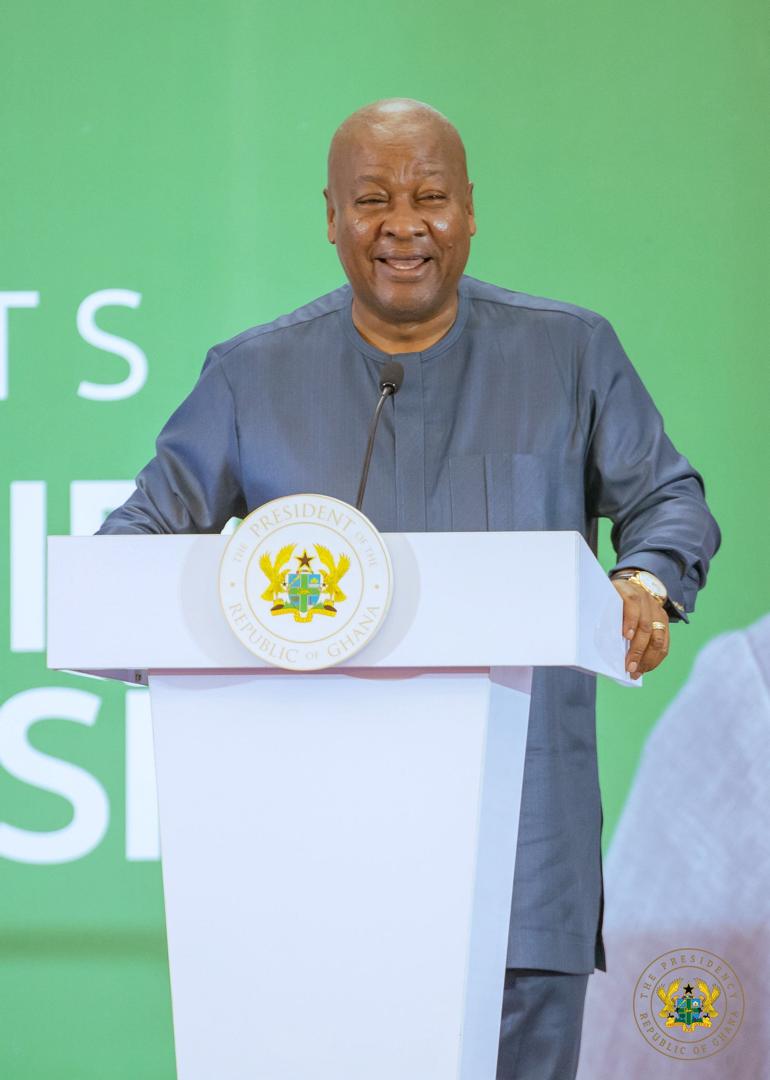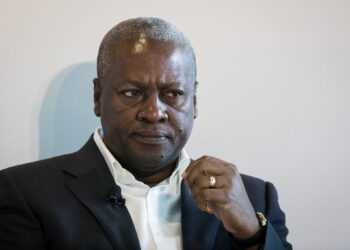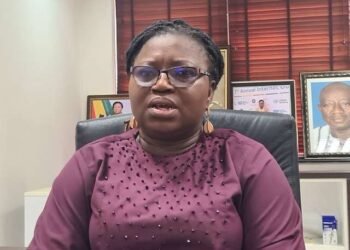President John Dramani Mahama has officially launched the National Apprenticeship Programme under the theme “Skills for Prosperity: Empowering Ghana’s Future.”
At a vibrant and symbolic ceremony held at the University for Development Studies (UDS) Auditorium in Tamale, the President noted that the initiative marks a cornerstone in his administration’s broader agenda to address the rising tide of youth unemployment by equipping young Ghanaians with marketable, twenty-first-century skills.
In a heartfelt address, President Mahama described the programme as a bold demonstration of his party’s unwavering commitment to the development of Ghana’s youth, the most vital resource of the nation.
“It also reaffirms the pledge contained in the National Democratic Congress manifesto of 2024 to equip young people with relevant, marketable skills that meet the demands of the twenty-first-century youth population with limited skills.
“But Ghana is blessed with a vibrant and youthful population. Yet too many of our young citizens find themselves battling unemployment and underemployment.”
HE President John Dramani Mahama
Citing recent data from the Ghana Statistical Service, President Mahama drew attention to the growing crisis: a youth unemployment rate of 12.6% among those aged 15 to 35, and a staggering 29% of young people who are neither in education, employment, nor training.
“These figures are not just statistics, as they represent the real lives of our children. We will not stand by while our young people are denied the opportunities they deserve to thrive.”
HE President John Dramani Mahama
Strategic Response to Unemployment
The National Apprenticeship Programme, according to President Mahama, is the NDC’s strategic response to these alarming trends.
As part of the party’s pledge to create one million jobs for the youth in key sectors such as agriculture, manufacturing, information and communications technology (ICT), and vocational training, this programme stands as a significant first step.
It is set to offer structured, high-quality vocational training to over 500,000 young Ghanaians over the next five years, beginning with an initial cohort of 10,000 apprentices nationwide in 2025.

The scope of the programme is extensive and designed to meet the diverse aspirations and talents of Ghana’s youth.
In agriculture and agro-processing, apprentices will be trained in modern and sustainable practices such as fish farming, poultry keeping, beekeeping, food preservation, and packaging.
Also, in the construction and craftsmanship fields, President Mahama noted that young Ghanaians will be equipped with skills in masonry, carpentry, plumbing, electrical work, and traditional crafts such as pottery, bead-making, and leatherwork.
He also noted that fashion and beauty will not be left out, adding that opportunities abound for those interested in dressmaking, hairdressing, and makeup artistry.
In manufacturing, trainees will explore welding, furniture making, and even basic robotics—signifying a forward-looking component of the programme aimed at fostering innovation.
For the emerging renewable energy sector, apprentices will be introduced to solar technologies and energy efficiency.
The programme also places special focus on the hospitality and tourism industry. Young Ghanaians will be trained in culinary arts, events management, eco-tourism, and tourist guiding, giving them the skills to participate in and profit from Ghana’s growing tourism economy.
In the automotive field, training will be provided in mechanics, electronic vehicle servicing, and computerised diagnostics.
Meanwhile, in the realm of digital services, the programme will introduce courses in software development, data analysis, and graphic design.
Inclusive Design
A unique feature of the National Apprenticeship Programme, according to the President, is its inclusive design.
He disclosed that each apprentice will receive a monthly stipend and a transportation allowance to reduce the financial burden of training.
“You will also receive starter toolkits. So if you want to become a seamstress, you’ll get your pair of scissors, your tape, your needles, and all the things that you need to start how to work.
“At the end of the program, you are professionally qualified in the trade that you went to learn. And you can use that certificate if you want to find a job or go into self-employment”.
HE President John Dramani Mahama
Moreover, President Mahama assured that gender inclusivity is central to the programme’s framework.
At least 45% of the apprenticeship slots will be reserved for women and girls. The programme also aims to prioritise participation by vulnerable and marginalised groups across all regions, ensuring no one is left behind.
President Mahama stressed that “we are building an apprenticeship system that will leave no one behind.” To ensure relevance and quality, the training will follow a dual apprenticeship model.
Dual Apprentice Model
This model combines theoretical classroom-based education, which will account for 30% of the training, with practical hands-on experience, which will make up the remaining 70%.

Classroom instruction will be offered in local languages where needed, accommodating trainees with limited formal education. The programme will offer both short-term (2–4 months) and long-term (12–18 months) training modules, depending on the skill level and trade.
Phase One, starting in 2025, will see the enrolment of 10,000 apprentices across all districts in Ghana. From 2026 onwards, the government aims to scale up the programme to train 100,000 youth each year.
According to the President, application forms will be made available both online—through the National Youth Authority’s portal, and at Metropolitan, Municipal, and District Assemblies nationwide beginning in May 2025.
Importantly, President Mahama assured the public that the programme is fully funded, adding that a provision of GHS 300 million has been allocated in the 2025 budget by the Minister for Finance.
This, he noted, sets the programme apart from many previous youth initiatives that faltered due to financial constraints.
He underscored that the programme is not a last-minute campaign gimmick, but a thoroughly planned national policy for long-term youth empowerment and development.

The coordination of the National Apprenticeship Programme will be overseen by the Ministry of Youth Development and Empowerment, working in collaboration with the National Youth Authority, the Ministry of Education, and international development partners, including the United States Government.
President Mahama extended his appreciation to the Alliance for a Green Revolution in Africa and other partners for their support in the programme’s design and implementation.
In his closing remarks, the President reiterated the programme’s transformative vision, stressing that over the next five years, the initiative is projected to train more than half a million youth, contribute to a 40% average increase in incomes among beneficiaries, and support the creation of over 25,000 new small businesses.
By building a skilled workforce, he added, the programme will accelerate Ghana’s path toward industrialisation, job creation, and sustainable development.
The launch of the National Apprenticeship Programme in Tamale represents more than a policy announcement. It embodies a vision of hope, practical opportunity, and national renewal.




















